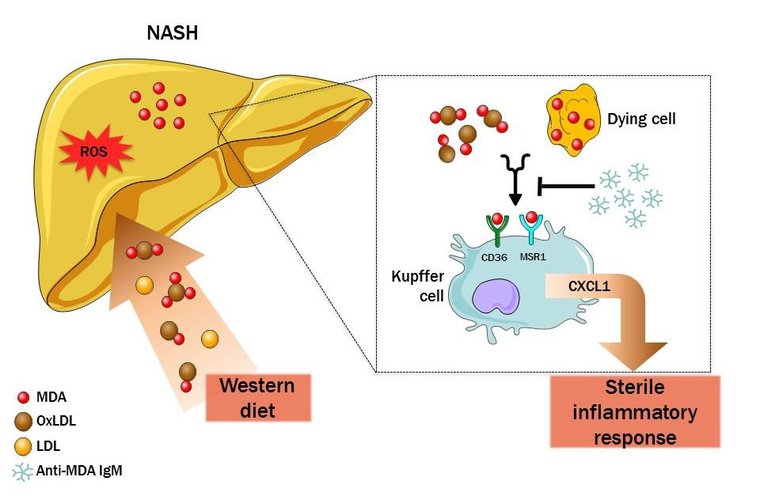Biomarker for oxidative stress plays a major role in hepatic inflammation
Share
Diet-related diseases like non-alcoholic fatty liver disease (NAFLD) are known to have a major inflammatory component. However, the molecular pathways linking diet-induced changes with inflammation remained elusive. In a new study, Christoph Binder’s Group at CeMM and the Medical University of Vienna identified crucial inflammatory processes in NAFLD and found that malondialdehyde (MDA), a biomarker for oxidative stress, plays a key role in the development of NAFLD and can be neutralized by specific natural antibodies – a novel approach towards a potential therapy for the prevalent disease.
Worldwide, the incidences of obesity, hypertension or insulin resistance are alarmingly high. As a consequence, risk of developing inflammation-associated diseases like type 2 diabetes, NAFLD and cardiovascular disease increased accordingly. However, the exact pathways that link the eating habits with the ensuing inflammation were so far not well understood.
The team of Christoph Binder, Professor of Atherosclerosis Research at the Medical University of Vienna and Principal Investigator at CeMM, in collaboration with Ronit Shiri-Sverdlov at the Maastricht University, Christoph Reinhardt at the University Medical Center of the Johannes Gutenberg University Mainz and the German Center for Cardiovascular Research Mainz was not only able to shed light on the biological processes that lead to the development of chronic inflammation upon a nutrient rich diet in mice. Moreover, the Scientist found MDA to be a key player in hepatic inflammation which can be neutralized with natural antibodies. Their results were published in Hepatology (DOI: 10.1002/hep.28970). Shared co-first authors of the study are Clara Jana-Lui Busch, PhD Student at CeMM and the Medical University of Vienna, and Tim Hendrikx, PostDoc in the group of Christoph Binder.
“This study shows how the close collaboration of CeMM and the Medical University Vienna fosters the development of a future precision medicine”, says senior author Christoph Binder. “With cutting edge RNA sequencing methods and bioinformatic analyses of transcriptome data, we discovered key mechanisms in some of the most prevalent diseases and we confirmed those findings in mice models.” Binder explains, and adds: “Above that, the administration of specific antibodies for MDA epitopes provide a promising new approach for the development of therapeutic strategies.”
Publication:
Clara Jana-Lui Busch*, Tim Hendrikx*, David Weismann, Sven Jäckel, Sofie M. A. Walenbergh, André F. Rendeiro, Juliane Weißer, Florian Puhm, Anastasiya Hladik, Laura Göderle, Nikolina Papac-Milicevic, Gerald Haas, Vincent Millischer, Saravanan Subramaniam, Sylvia Knapp, Keiryn L. Bennett, Christoph Bock, Christoph Reinhardt, Ronit Shiri-Sverdlov and Christoph J. Binder (*shared first author). Malondialdehyde epitopes are sterile mediators of hepatic inflammation in hypercholesterolemic mice. Hepatology, Dec 16 2016. DOI: 10.1002/hep.28970
Funding:
This study was supported by the Austrian Science Fund (FWF, SFB Lipotox F30), Boehringer Ingelheim (PhD Fellowship), Austrian Academy of Sciences (Doc Fellowship), EMBO (Short Term Fellowships), The Netherlands Organisation for Scientific Research (NWO), German Center for Cardiovascular Research (DZHK), German Federal Ministry of Education and Research, and the German Research Foundation (DFG).

